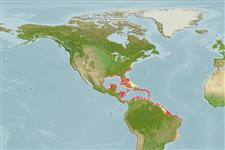Preferred temperature (Ref.
115969): 23.4 - 28.1, mean 27.3 (based on 977 cells).
Phylogenetic diversity index (Ref.
82804): PD
50 = 0.5000 [Uniqueness, from 0.5 = low to 2.0 = high].
Bayesian length-weight: a=0.00977 (0.00522 - 0.01830), b=3.01 (2.86 - 3.16), in cm Total Length, based on LWR estimates for this species & Genus-body shape (Ref.
93245).
Trophic level (Ref.
69278): 4.5 ±0.4 se; based on diet studies.
Daya lenting (Ref.
120179): sedang, Waktu penggandaan populasi minimum 1.4 - 4.4 tahun (Fec=160,000; assuming tm=2-4).
Prior r = 0.37, 95% CL = 0.25 - 0.56, Based on 1 data-limited stock assessment.
Fishing Vulnerability (Ref.
59153): Very high vulnerability (90 of 100).
Climate Vulnerability (Ref.
125649): High vulnerability (57 of 100).
